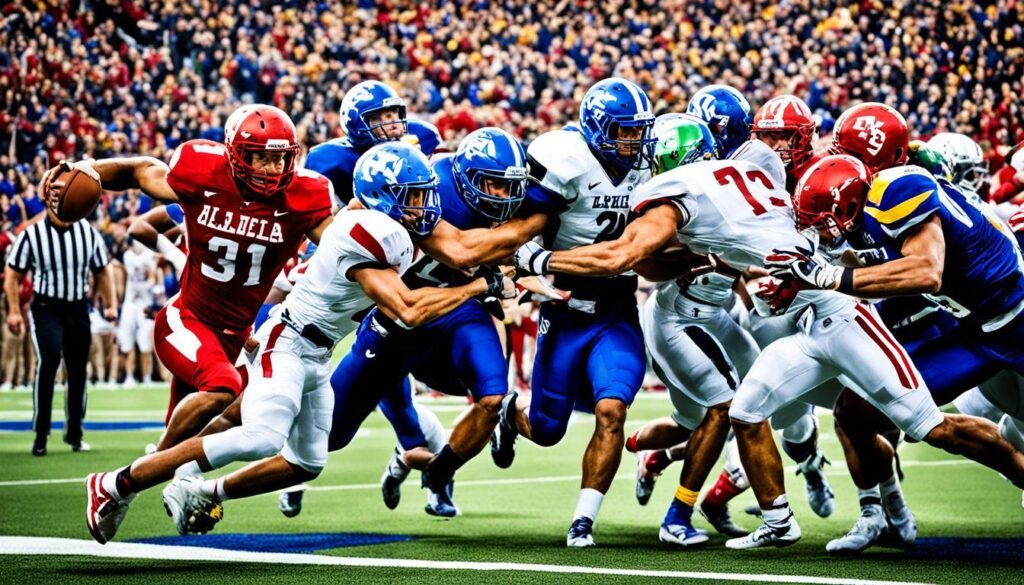Welcome to the exciting world of college and university sports, where the pursuit of athletic glory unfolds on campuses across the nation. From the adrenaline-fueled competitions organized by the NCAA to the dedication of collegiate athletics departments, the landscape of college sports is vibrant and teeming with passion. Whether you are a student-athlete, a sports enthusiast, or simply intrigued by the thrill of collegiate athletics, this article will provide you with an inside look into the captivating realm of college sports.
Key Takeaways:
- College and university sports offer a vibrant and exciting environment for athletic competition.
- The NCAA plays a pivotal role in organizing and governing college sports programs.
- Collegiate athletics departments are responsible for managing and supporting varsity teams.
- Athletic scholarships provide opportunities for student-athletes to pursue their athletic dreams while obtaining an education.
- Intercollegiate sports competitions showcase the skills and talents of student-athletes.
The Thrilling World of College Athletics
When it comes to college sports, the excitement is palpable. College athletics encompass a wide range of sports, offering thrilling opportunities for student-athletes to showcase their skills and compete at the collegiate level. From the roaring crowds at college football games to the intense rivalries in college basketball, the world of university sports teams is a vibrant and dynamic one.
Universities across the country field their own sports teams, each representing their institution with pride. These teams compete in a variety of NCAA sports, participating in leagues and tournaments to prove their mettle and seek glory. The dedication and passion of student-athletes drive the collegiate sports scene, pushing the boundaries of excellence and inspiring future generations.
“College athletics is a unique experience, providing student-athletes with the opportunity to embrace teamwork, discipline, and personal growth. It’s not just about the thrill of competition but also the lifelong memories and friendships formed along the way.”
A Multitude of Sports and Rivalries
College athletics offers a diverse range of sports for both athletes and fans to enjoy. From traditional favorites like football, basketball, and baseball to lesser-known sports like lacrosse, soccer, and swimming, there is something for everyone. Student-athletes dedicate countless hours to training and perfecting their craft, honing their skills to excel in their chosen sport.
One aspect that adds to the excitement of college sports is the intense rivalries between universities. These rivalries transcend the field or court and become deeply entrenched in the culture of the institutions involved. The annual face-offs between rival teams create an electric atmosphere, fostering camaraderie among fans and adding to the allure of college athletics.
The Impact of College Athletics
College athletics extends beyond the playing field, making a profound impact on the lives of student-athletes. Through the pursuit of their athletic dreams, these individuals develop essential life skills such as teamwork, time management, and perseverance. They learn to balance the demands of academics with the rigors of training and competition, instilling discipline and resilience that will serve them well in their future endeavors.
The Role of NCAA
The National Collegiate Athletic Association (NCAA) plays a vital role in college athletics, working to ensure fairness, integrity, and student-athlete well-being. The NCAA sets rules and regulations governing collegiate sports, allowing for a level playing field and equal opportunities for all participating teams. With their commitment to promoting academic success alongside athletic achievement, the NCAA strives to create a balanced and enriching experience for student-athletes.
As the fervor and excitement of college athletics continue to captivate fans and athletes alike, the thrilling world of college sports is set to embark on a journey of endless possibilities. From the relentless pursuit of athletic excellence to the transformative experiences that shape lives, college athletics remain a cherished tradition in the realm of university sports teams.
The Role of Athletics Department in College Sports
In the realm of college sports, the athletics department plays a pivotal role in managing and overseeing the various college sports programs. With a responsibility to ensure the smooth functioning of the athletics division, the department serves as a guiding force for student-athletes, coaches, and administrators alike.
The athletics department takes charge of various essential tasks, including:
- Managing the varsity teams
- Providing support to student-athletes in balancing academics and athletics
- Scheduling and organizing sports competitions
- Facilitating team practices and training
- Maintaining sports facilities and equipment
Supporting Student-Athletes
The athletics department recognizes the importance of supporting student-athletes in all aspects of their college journey. They prioritize the well-being of their athletes, ensuring they have access to proper training facilities, experienced coaches, and medical support.
“Our goal is to provide a nurturing environment where student-athletes can thrive academically and athletically. We provide resources and guidance to help them excel in both their chosen sport and their studies.”
Athletics and Academics: Striking a Balance
The athletics department understands the importance of maintaining a healthy balance between academics and athletics. They work closely with student-athletes to create schedules that allow for successful participation in sports while meeting academic requirements. Academic support services, such as tutoring and study halls, are also provided to ensure student-athletes receive the necessary assistance to succeed in their studies.
The Role of Coaches
Coaches are vital figures within the athletics department. They guide and mentor student-athletes, providing them with expertise, motivation, and guidance to enhance their athletic performance. Coaches not only focus on developing athletic skills but also emphasize character-building and instilling important values such as teamwork and dedication.
The athletics department strives to create an environment where student-athletes can grow both on and off the field, nurturing their talents and fostering their personal development. The department’s dedication to excellence drives the success of college sports programs, showcasing the incredible achievements of varsity teams and the transformative experiences of student-athletes.
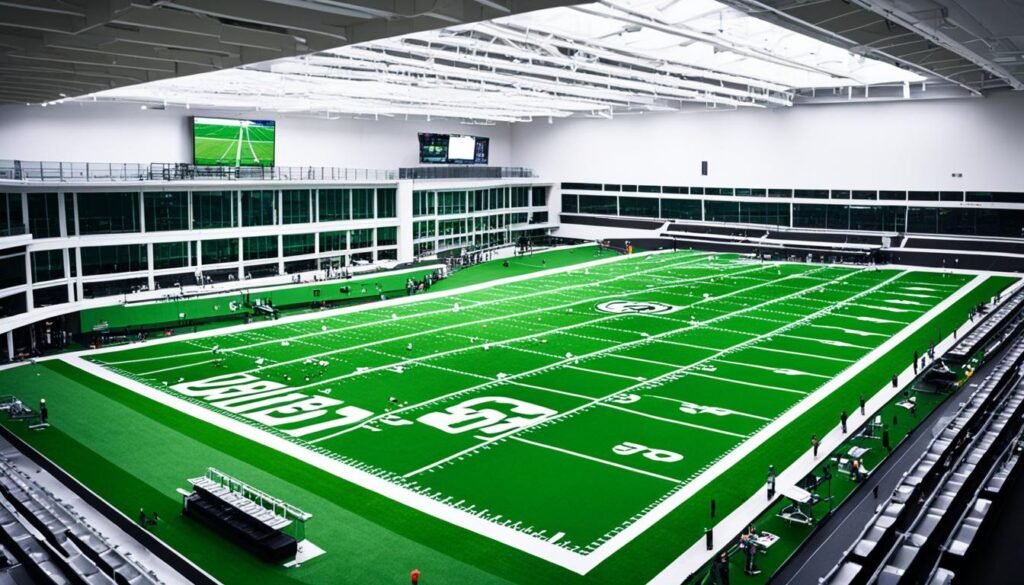
| Responsibilities | Description |
|---|---|
| Managing Varsity Teams | The athletics department oversees the varsity teams, ensuring they have the necessary resources, coaching staff, and support to compete at a high level. |
| Supporting Student-Athletes | The department provides support to student-athletes, helping them navigate both the academic and athletic aspects of their college experience. |
| Scheduling and Organizing Competitions | From regular season matches to championship events, the athletics department manages the scheduling and organization of sports competitions. |
| Facilitating Training and Practices | Ensuring that teams have access to suitable training facilities and practice times is a key responsibility of the athletics department. |
| Maintaining Facilities and Equipment | The department is responsible for the upkeep and maintenance of sports facilities and equipment, ensuring they meet necessary safety standards. |
The Importance of Sports Scholarships
Sports scholarships are vital for student-athletes who aspire to pursue their athletic dreams while obtaining a quality education. These scholarships provide essential financial support, often covering tuition fees, allowing student-athletes to focus on their athletic training and compete at the collegiate level.
With the rising costs of education, sports scholarships offer a lifeline to talented individuals who may otherwise struggle to afford college. By alleviating the financial burden, these scholarships enable student-athletes to fully immerse themselves in their athletic pursuits while simultaneously earning a degree.
Sports scholarships not only provide financial assistance but also open doors to opportunities that may have otherwise remained closed. They attract the attention of college coaches and recruiters, increasing the chances of being recruited into top-tier collegiate sports programs. Through these programs, student-athletes receive top-tier training, access to state-of-the-art facilities, and the opportunity to compete against the best of the best.
“Sports scholarships create an avenue for student-athletes to excel academically and athletically, propelling them towards a brighter future.”
Moreover, sports scholarships instill a sense of motivation and determination in student-athletes. The recognition and support provided through these scholarships validate their talent and hard work, bolstering their confidence and dedication. The belief that their skills are valued and that they are capable of achieving greatness fuels their pursuit of excellence both on and off the field.
It is important to note that sports scholarships are often competitive and require student-athletes to maintain a certain level of academic performance. This ensures that recipients of these scholarships prioritize their education while excelling in their respective sports. Student-athletes must strike a balance between their rigorous training schedules and their academic responsibilities, honing valuable time-management and multitasking skills that will serve them well in their future endeavors.
Overall, sports scholarships play an integral role in college sports, empowering student-athletes to pursue their athletic passions while earning a degree. They provide financial stability, open doors to opportunities, and instill a sense of recognition and motivation in student-athletes. Without sports scholarships, many talented individuals would forego their dreams of competing at the collegiate level, depriving the world of their incredible athletic abilities.
The Excitement of Intercollegiate Sports Competitions
Intercollegiate sports competitions are the epitome of athletic excitement, bringing together teams from different colleges and universities to showcase the extraordinary talent and skill of student-athletes. These thrilling competitions not only ignite the competitive spirits of the participants but also foster a sense of camaraderie and sportsmanship among all those involved.
When intercollegiate sports teams collide on the field or court, spectators are treated to nail-biting moments of intense competition and breathtaking displays of athleticism. The atmosphere is electric, as fans cheer for their favorite teams, creating an ambiance that is unrivaled in collegiate sports.
These competitions serve as the ultimate stage for student-athletes to put their abilities to the test and make their institutions proud. From intense rivalries to captivating underdog stories, intercollegiate sports competitions captivate audiences and keep them on the edge of their seats.
Not only do these competitions provide thrilling moments for spectators, but they also offer invaluable experiences for student-athletes. The pressure of representing their college or university pushes athletes to give their all and showcase their utmost dedication to their sport. Through these experiences, student-athletes learn valuable life lessons in teamwork, perseverance, and resilience that extend far beyond the confines of the game.
Intercollegiate sports competitions also play a pivotal role in building a sense of unity among colleges and universities. They bring together athletes, students, alumni, and faculty, fostering a shared pride and passion for their respective institutions. These events create bonds and connections that transcend the boundaries of individual campuses, strengthening the overall collegiate sports community.
Intercollegiate sports competitions showcase the talent and teamwork of student-athletes, creating unforgettable moments of athletic brilliance and inspiring new generations of athletes to reach for the stars.
So whether you’re cheering from the sidelines, watching on TV, or participating as an athlete, intercollegiate sports competitions offer an unparalleled thrill that brings communities together and celebrates the power of human excellence.
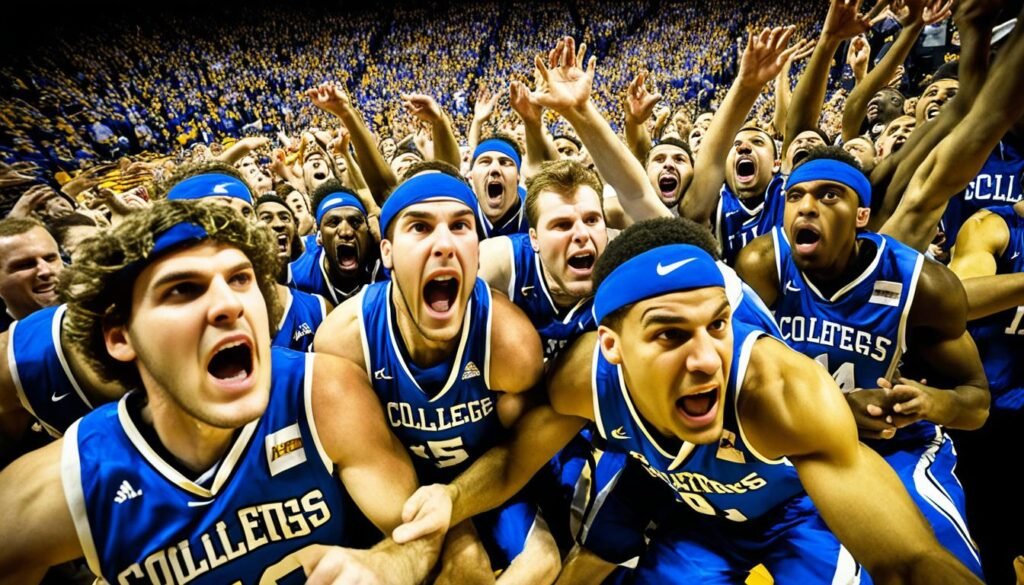
| Benefits of Intercollegiate Sports Competitions | Impact on Participant | Impact on Community |
|---|---|---|
| 1. Enhances athletic skills and abilities | 1. Builds character and resilience | 1. Creates a sense of unity and school pride |
| 2. Promotes teamwork and cooperation | 2. Develops leadership qualities | 2. Fosters community engagement |
| 3. Provides opportunities for personal growth | 3. Teaches time management and discipline | 3. Enhances the college experience |
College Athletics Recruiting: Finding the Next Stars
College athletics recruiting is a vital process in the search for talented student-athletes who possess the exceptional skills and potential to contribute to the success of college sports programs. Coaches and recruiters dedicate their efforts to carefully evaluating and identifying these future stars, considering various factors such as athletic abilities, academic records, and character traits.
During the college athletics recruiting process, potential recruits are assessed to ensure a good fit within the team dynamics and the overall athletic program. Evaluations take into account not only the athletic prowess of the candidates but also their commitment, dedication, and ability to thrive in the competitive collegiate sports environment.
Coaches and recruiters closely examine the athletic abilities of potential recruits, assessing their technical skills, physical attributes, and strategic thinking. The goal is to identify athletes who possess exceptional talent and have the potential to make a significant impact on the field or court.
In addition to athletic abilities, academic records are also crucial elements considered in the college athletics recruiting process. Student-athletes are expected to maintain a balance between their academic and athletic responsibilities, and as such, their academic performance and potential for success in the classroom are evaluated.
Character assessment is another essential aspect of college athletics recruiting. Coaches and recruiters seek individuals who demonstrate leadership qualities, sportsmanship, teamwork, and a strong work ethic. These character traits contribute not only to the success of the team but also to the overall positive and supportive environment within the program.
The Importance of College Athletics Recruiting
“The college athletics recruiting process is instrumental in ensuring the future success of college sports programs. By carefully evaluating and selecting the most promising student-athletes, colleges and universities can build competitive teams that strive for excellence and contribute to the rich athletic legacy of their institutions.”
The recruitment of talented student-athletes is a highly competitive process, with colleges and universities vying for the top prospects. Coaches and recruiters work tirelessly to identify and attract the best talent, often attending high school games, tournaments, and showcases to scout potential recruits.
Furthermore, college athletics recruiting plays a crucial role in shaping the overall athletic landscape of collegiate sports. It provides opportunities for student-athletes to showcase their skills, pursue their passion for sports, and potentially earn scholarships that can further their education.
Overall, college athletics recruiting is a multi-faceted process that involves careful evaluation and selection. Coaches and recruiters aim to find the next stars who possess the talent, dedication, and character to excel in college sports and make a lasting impact on their athletic programs.

College Sports Achievements: Celebrating Success
College sports achievements are a testament to the dedication and hard work of student-athletes, teams, and coaches. These accomplishments, ranging from championship victories to individual accolades, showcase the exceptional talent and commitment found within the world of college sports.
One notable example of college sports achievements is the record-breaking performance of Michael Phelps during his time at the University of Michigan. With a total of 28 Olympic medals, Phelps stands as the most decorated Olympian of all time. His remarkable success in the pool not only brought pride to his university but also inspired aspiring swimmers around the world.
“I couldn’t have achieved any of my success without the support and guidance of my coaches and teammates at the University of Michigan. They pushed me to be the best version of myself and helped me reach heights I never thought possible.”
College sports achievements are not limited to individuals. Team accomplishments, such as winning conference championships or national titles, demonstrate the power of teamwork and the ability to overcome challenges. The University of Alabama football team, for example, has dominated the NCAA scene with multiple national championships under the guidance of head coach Nick Saban.
Highlighting these achievements through ceremonies, awards, and media recognition serves to motivate future generations of student-athletes and inspire them to strive for greatness both on and off the field. College sports achievements foster a sense of pride within the college community, uniting students, alumni, and fans in a common celebration of success.
Student-Athlete Achievements
The achievements of student-athletes extend beyond the field of play. Many excel academically, balancing their athletic commitments with rigorous coursework and demonstrating their ability to succeed in diverse areas.
Emma Johnson, a track and field athlete at Stanford University, exemplifies the success that can be achieved both athletically and academically. As a star sprinter and a pre-med student, Emma not only broke numerous school records but also maintained an exceptional GPA. Her accomplishments garnered recognition not only within the athletics department but also across the entire campus.
Whether it’s through record-breaking performances, championship victories, or academic excellence, college sports achievements serve as a source of inspiration for the entire collegiate community. They remind us of the immense potential within each student-athlete and showcase the transformative power of college sports.
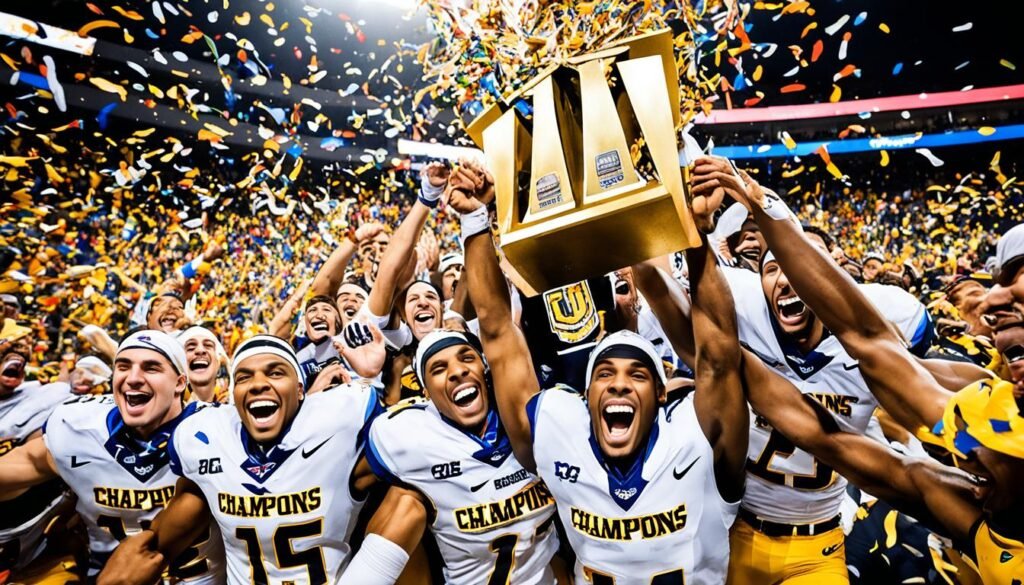
| College Sports Achievements | Notable Figures |
|---|---|
| Most Olympic Medals | Michael Phelps – University of Michigan |
| Most NCAA Football National Championships | University of Alabama |
| Academic and Athletic Excellence | Emma Johnson – Stanford University |
The Impact of College Sports on Campus Life
College sports have a profound influence on campus life, creating a vibrant and inclusive atmosphere that brings together students, faculty, and alumni. They play a crucial role in fostering school spirit and creating a sense of community among members of the college family.
Participating in or supporting college sports encourages a strong bond and loyalty to the institution, as students and alumni rally behind their teams. The shared excitement and support contribute to the overall vibrancy and energy on campus, making it a special place to be.
College sports events, whether it’s an exhilarating football game or a nail-biting basketball match, become epicenter of campus life. The entire community converges, creating a palpable sense of anticipation and joy. Cheering, chanting, and celebrating together, students proudly display their school colors and mascot, united in their love for college sports.
“College sports bring together students, faculty, and alumni, fostering school spirit and creating a sense of community.”
The impact goes beyond the field or court, extending into academic and social aspects of campus life. The shared experience of college sports encourages friendships and connections between students who may otherwise have never crossed paths. Whether it’s discussing last night’s game in the dining hall or joining fan clubs and organizations dedicated to supporting the teams, college sports provide a common thread that unites individuals from diverse backgrounds.
Moreover, college sports events serve as a platform for community engagement and interaction. They bring together people of all ages and backgrounds, as families, alumni, and local residents join in the excitement. The atmosphere is electric, with the entire campus buzzing with anticipation and pride.
By integrating college sports into campus life, educational institutions foster a sense of pride and identity. Students, faculty, and alumni can channel their school spirit into supporting the college’s achievements in athletic competitions, forging lasting memories and camaraderie.
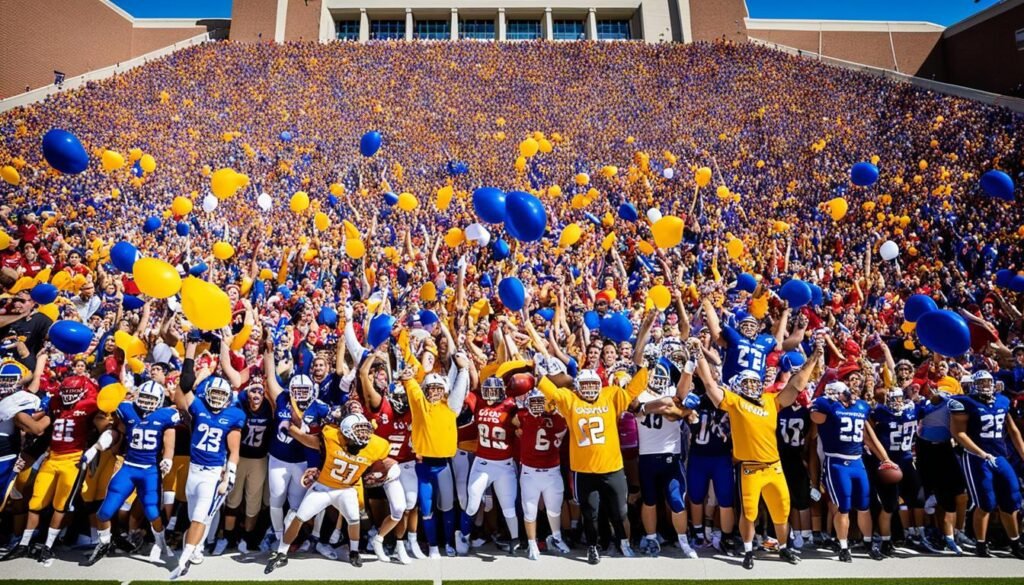
The Impact of College Sports on Campus Life: A Visual Representation
| Benefits of College Sports on Campus Life | |
|---|---|
| 1. Fosters school spirit and unity | |
| 2. Creates a sense of community | |
| 3. Encourages social connections | |
| 4. Provides a platform for community engagement | |
| 5. Enhances pride and identity |
The Future of College and University Sports
The future of college and university sports holds endless possibilities. As the landscape continues to evolve, various factors will shape the direction of collegiate athletics. Advancements in technology, changes in regulations, and a growing emphasis on athlete well-being will all play significant roles in defining the future of college and university sports.
Technology is revolutionizing the way sports are played, coached, and experienced. From wearable fitness trackers to virtual reality training simulations, student-athletes and coaches have access to tools that enhance performance, minimize injuries, and optimize training methods. The integration of data analytics and artificial intelligence in sports management allows for more informed decision-making, talent identification, and strategic game planning.
Regulations governing college sports are also evolving to address emerging issues and ensure the welfare of student-athletes. With a greater focus on athlete wellness, there will be increased efforts to prevent and manage injuries, provide mental health support, and implement fair compensation models. As the NCAA and other organizations adapt to the changing landscape, college sports will become more inclusive, equitable, and sustainable.
“The future of college and university sports is bright. With advancements in technology and a focus on athlete well-being, we can expect to see unprecedented levels of performance, safety, and fairness in collegiate athletics.” – Coach Smith, University of XYZ
In the future, student-athletes will have access to more opportunities to excel and leave their mark in college sports. Athletic scholarships will continue to provide financial support for talented individuals, enabling them to pursue their athletic dreams while obtaining a quality education. The recruitment process will become more efficient, with coaches and recruiters leveraging technology and data to identify promising talent.
The future of college and university sports is an exciting one. With advancements in technology, evolving regulations, and a strong commitment to athlete well-being, the stage is set for a new era of collegiate athletics.
The Transformational Power of College Sports
College sports have the power to transform lives, offering student-athletes valuable lessons in teamwork, discipline, and resilience. The experiences and skills gained through college sports can shape their future careers and contribute to personal growth and development. Whether it’s the thrill of a game-winning shot, the camaraderie on the field, or the perseverance to overcome obstacles, college sports have a profound impact on the lives of those involved.
Through the challenges and triumphs experienced in college sports, student-athletes develop important life skills that extend far beyond their athletic careers. The virtues of teamwork and cooperation learned through training and competing as part of a team teach valuable lessons about collaboration and communication that are applicable in various domains of life. College sports demand discipline and time management skills, as athletes must balance their academic responsibilities with rigorous training schedules. This ability to juggle multiple commitments and prioritize tasks is a skill that serves student-athletes well beyond their college years.
“College sports have the power to transform lives, offering student-athletes valuable lessons in teamwork, discipline, and resilience.”
The resilience developed through college sports is invaluable. Athletes face setbacks and obstacles, whether it be a tough loss, a debilitating injury, or a grueling training regimen. However, through these challenges, student-athletes learn to persevere, adapt, and bounce back stronger. The mental fortitude and resilience gained in college sports become vital assets in navigating the ups and downs of life.
Furthermore, college sports provide a platform for personal growth and development. Student-athletes not only improve their physical abilities but also cultivate leadership skills, enhance self-confidence, and learn to manage pressure. The experiences and lessons learned in college sports empower individuals to excel in their future endeavors, whether it be in their professional careers or personal lives.
The transformational power of college sports extends beyond the individual athlete. College sports have a way of bringing communities together, fostering school spirit, and creating lasting memories. The collective excitement and support surrounding college sports events create a sense of belonging and unity among students, alumni, and fans. These shared experiences strengthen the bonds within a community and create a lifelong connection to the alma mater.
The impact of college sports is undeniable. It shapes the lives of student-athletes, instilling in them values of discipline, teamwork, and resilience that transcend the bounds of the athletic field. It cultivates personal growth, develops critical life skills, and forms a sense of community. College sports hold the power to inspire, motivate, and transform the lives of those who participate and those who cheer from the sidelines.
| Benefits of College Sports | Description |
|---|---|
| Teamwork | Student-athletes learn the importance of collaboration and cooperation, valuable skills that translate to various aspects of life. |
| Discipline | College sports require dedication, perseverance, and adherence to training regimens, fostering discipline and time management skills. |
| Resilience | Athletes face setbacks and challenges, teaching them to overcome adversity and bounce back stronger. |
| Leadership | College sports provide opportunities for student-athletes to develop leadership skills, both on and off the field. |
| Personal Growth | Participation in college sports allows individuals to grow, gain confidence, and discover their potential. |
| Community | College sports unite students, alumni, and fans, creating a strong sense of community and school spirit. |
Conclusion
College and university sports are an integral part of the collegiate experience, offering student-athletes a platform to excel both athletically and academically. With organizations like the NCAA guiding and supporting sports programs, collegiate sports have become a thriving arena of competition, passion, and teamwork.
These sports programs provide countless opportunities for student-athletes to showcase their skills, pushing their boundaries and reaching new heights of achievement. Whether it’s the exhilaration of a game-winning shot or the teamwork required to secure a championship, college sports captivate audiences and inspire the next generation of athletes.
Moreover, college and university sports serve as catalysts for community building, uniting students, faculty, and alumni in support of their teams. The electric atmosphere surrounding college sports events fosters school spirit and creates a sense of belonging on campus.
As we look to the future, the landscape of college and university sports continues to evolve, driven by advancements in technology and an increased emphasis on athlete well-being. The transformational power of college sports will continue to shape the lives of student-athletes, instilling values such as discipline, resilience, and teamwork that will carry them beyond their collegiate careers.
FAQ
What is the role of the athletics department in college sports?
How do sports scholarships impact college sports?
What are intercollegiate sports competitions?
How does college athletics recruiting work?
How are college sports achievements celebrated?
What is the impact of college sports on campus life?
What does the future hold for college and university sports?
Can college sports have a transformational impact?
How do college and university sports contribute to the collegiate experience?
Source Links
- https://navysports.com/news/2024/2/10/gymnastics-navy-places-second-at-2024-all-academy-championship.aspx
- https://dartmouthsports.com/news/2024/2/10/mtrack-dartmouth-concludes-regular-season-with-two-meets-on-saturday-240210.aspx
- https://gostanford.com/news/2024/2/10/mens-gymnastics-stanford-splits-tri-meet.aspx

